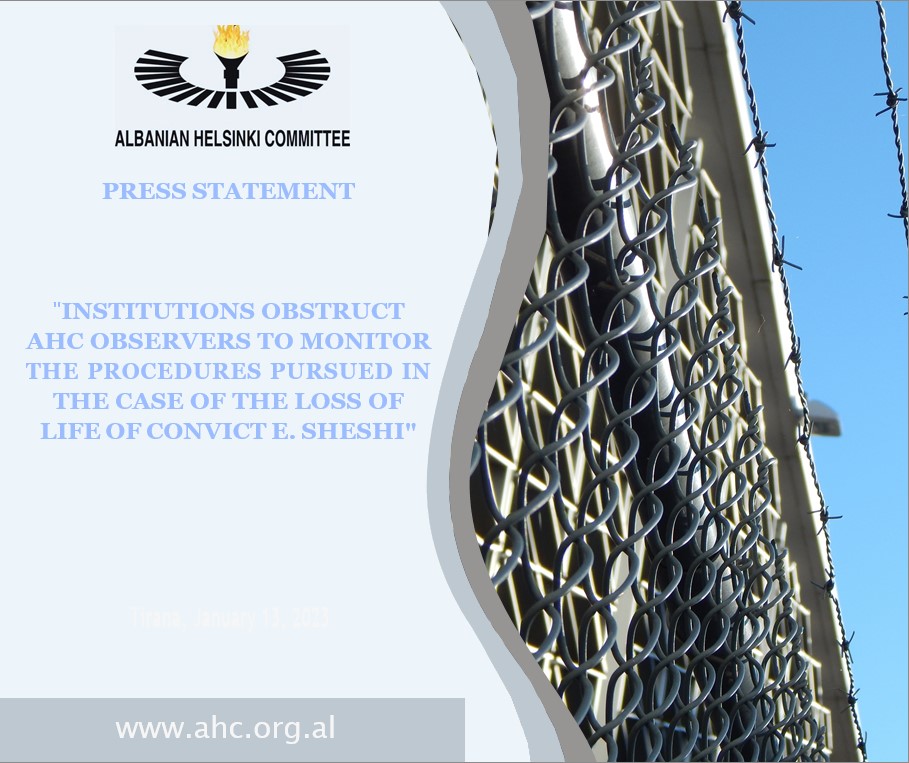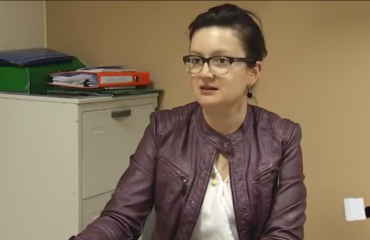The Albanian Helsinki Committee (AHC) was informed through the media that citizen E. Sheshi, a detainee in IEPD 313, due ot his health condition, was sent on 08.01.2023, to the Mother Teresa University Hospital Center (MTUHC), where he passed away. AHC conveys its sinecere condolences to the family of the deceased. Taking into consideration the media information and pursuant to its mission, AHC assigned a monitoring group to verify the case on site. The monitoring took place on January 10 and 11, 2023.
Initially, we addressed the Institution for the Execution of Penal Decisions (IEPD) 313 and met with the Director. He told us that the citizen never addressed any cardiac health complaints before the episode of 08.01.2023 (Sunday), around 16:10, when it is referred that he displayed concerns about some pain in his chest. It is claimed that immediately, he was offered primary medical assistance and then was transported by ambulance to the MTUHC. Stating that the case is being followed by the prosecution office and that it possesses everything on the case, the IEPD 313 director did not agree that AHC observers become familiar with relevant documentation for the admission of the deceased citizen to IEPD 313.1 In violation of the cooperation agreement that AHC has with the Directory of Prisons, it was not agreed that observers meet with the staff of the institution or examine the premises where the detainee had been accommodated.
Observers then went to the Tirana Judicial District Prosecution Office (the body carrying out criminal prosecution) and we were informed by the Coordination on the Right to Information that there was no criminal referral filed on the case. Should there be one such, we expect the prosecution office to conduct verifications within 5 days.
On the second day of the verification, AHC observers appeared in 4 different institutions of the State Police2 and after a long series of visits and being send off to different places by these authorities, it was concretized that in Commissariat no. 4, the Judicial Police Officer (JPO) had conducted some procedural actions on the case. He informed us that after receiving a notification from the operational room, that E.Sh. passed away at the MTUHC and was in the morgue, he went to the morgue and conducted some procedural actions to register evidence, such as ‘a process-verbal of the examination of the corpse for E.SSh, a process-verbal for the medical-legal (forensic) expertise, and data obtained from TIMS on the citizen.’ It is worth emphasizing that according to our legislation judicial police agents conduct actions when the need arises to preserve the traces of a criminal offense or the site of the incident, in keeping with provisions of the Criminal Procedure Code, and immediately notify the competent prosecution office.3 The JPO claims that he notified the
1 Drafted according to article 38 of law no. 81/2020 “On the rights and treatment of persons convicted to imprisonment and detainees”
2 Directory of Police Tirana, General Directory of State Police, Police Commissariat no. 3, Tirana, Police Commissariat no. 4, Tirana.
3 Article 6, Law No. 25/2019 ON THE ORGANIZATION AND FUNCTIONING OF THE JUDICIAL POLICE
prosecutor on these actions, but we were not made available any concrete information as to who this prosecutor was and how the prosecutor had been notified (by phone, letter, etc.).
Relevant process-verbals, held by the JPO of Commissariat no. 4, by official document no. 167/k prot, dated 10.11.2023, were sent to the Tirana Judicial District Prosecution Office, for further procedural actions and no criminal referral appears to have been filed. The verbal request of AHC observers to become familiar with this documentation was not accepted by him, on the grounds that they have been submitted to the prosecution office. Immediately after that, AHC observers went for a second time in 24 hours to the Tirana Prosecution Office. The Coordinator on the Right to Information said again that there appeared to be no case registered regarding the death of E.Sh. Asked about becoming familiar with the documentation sent by Commissariat no. 4, she clarified that they had not arrived at the prosecution office. She also inquired with the on-duty prosecutor covering the jurisdiction of Commissariat no. 4, whether she was aware of the above case, and informed the observers that prosecutor E.K. was not aware of the case.
AHC observers also went to two other institutions, such as the MTUHC Directory and the Forensic Institute (FI). At MTUHC, after waiting for a long time, we were informed that we had to file a request for information. FI representatives communicated to us that the results of the autopsy were not out yet (which took up to 30 days) and we had to file a request for information for every document we sought from them.
Referring to the jurisprudence of the Strasbourg Court, an immediate response by authorities on the investigation of suspicious deaths is generally essential in preserving public trust in the rule of law and the prevention of any form of secret agreements or tolerance toward illegal acts (see Merkulova vs. Ukraine, March 3, 2011), and Armani da Silva vs. the United Kingdom [DHM], March 30, 2016).
Based on the above, it results that AHC observers were not enabled to obtain information from relevant bodies, which would serve to clarify the case. This position is incompatible with the transparency that goes hand in hand with the principle of the responsibility of state institutions. In the case in question, reservations to provide information to an organization known for its mission, as AHC is, are unnecessary and create reasonable doubts in the eyes of an impartial and objective observer over the reasons for refusing information. Furthermore, it is harmful in terms of the immediacy and purpose of monitoring to request the filing of official requests to obtain a copy of these documents, if they are possessed on site by the bodies.
This approach of authorities creates a shrinking environment for defenders of human rgiths and freedoms and amplifies the burden of authorities to be investigate in an independent, objective, and efficacious manner the circumstances in which this citizen passed away, according to procedural obligations of article 2 of the European Convention of Human Rights that guarantees the right to life.
AHC suggests to the Tirana Judicial District Prosecution Office, as the criminal prosecution body, that on issues that are not investigation secrets, it inform the public on the actions it has carried out and is carrying out on the case, especially the victim’s family members.






